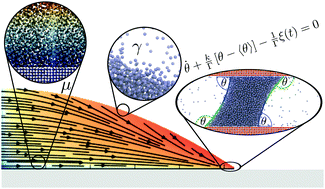A Langevin model for fluctuating contact angle behaviour parametrised using molecular dynamics
Abstract
Molecular dynamics simulations are employed to develop a theoretical model to predict the fluid–solid contact angle as a function of wall-sliding speed incorporating thermal fluctuations. A liquid bridge between counter-sliding walls is studied, with liquid–vapour interface-tracking, to explore the impact of wall-sliding speed on contact angle. The behaviour of the macroscopic contact angle varies linearly over a range of capillary numbers beyond which the liquid bridge pinches off, a behaviour supported by experimental results. Nonetheless, the liquid bridge provides an ideal test case to study molecular scale thermal fluctuations, which are shown to be well described by Gaussian distributions. A Langevin model for contact angle is parametrised to incorporate the mean, fluctuation and auto-correlations over a range of sliding speeds and temperatures. The resulting equations can be used as a proxy for the fully-detailed molecular dynamics simulation allowing them to be integrated within a continuum-scale solver.



 Please wait while we load your content...
Please wait while we load your content...